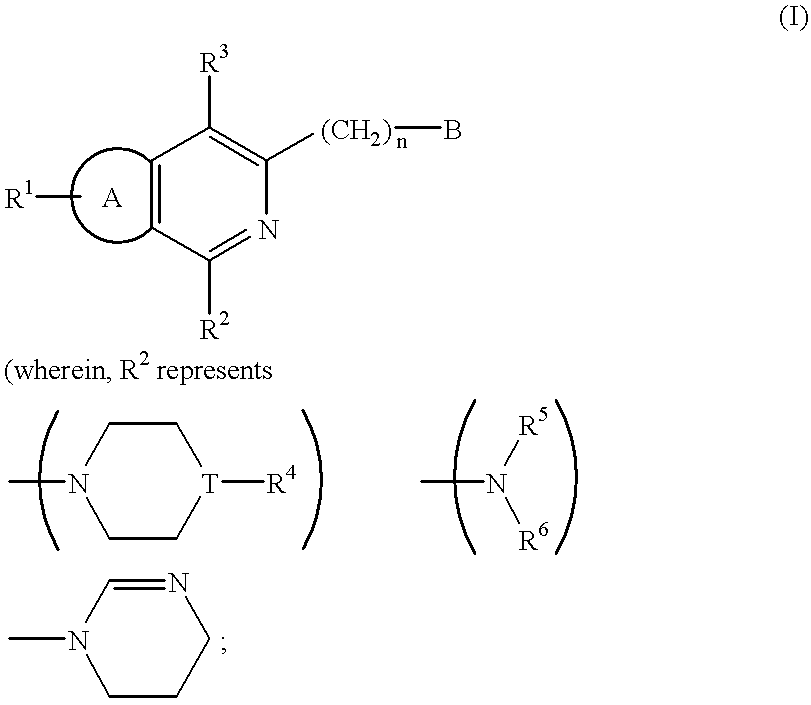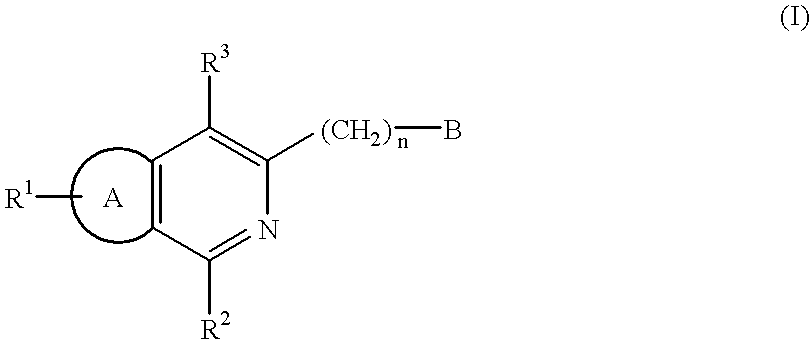Condensed pyridine compound
a compound and pyridine technology, applied in the field of condensed pyridine compound, can solve the problems of inability to achieve well-balanced principal action and side effects, too potent effect to merely ameliorate myotonia, and difficulty in chronic administration of medicaments
- Summary
- Abstract
- Description
- Claims
- Application Information
AI Technical Summary
Problems solved by technology
Method used
Image
Examples
example 1
Synthesis of 3-(4-benzyloxybutyl)-1-(4-ethylpiperazin-1-yl)isoquinoline dihydrochloride
[0607] (1-1) 2-[2-(4-Benzyloxybutyl)ethynyl]-5-methoxybenzaldehyde 14
[0608] 6-Benzyloxy-1-hexyne (5.60 g) and 2-bromo-benzaldehyde (2.90 g) were reacted in dimethylformamide (30 ml), in the presence of dichloro-bis-triphenylphosphinepalladium (0.40 g), cuprous iodide (0.20 g) and triethylamine (2.5 ml) in nitrogen atmosphere at 50.degree. C. for 6 hr. The resulting reaction solution was evaporated, and ethyl acetate and water were added to the resulting residue. The resulting organic layer was washed with water and brine, and dried over magnesium sulfate. The solvent was evaporated, and the resulting residue was purified by silica gel column chromatography (ethyl acetate / hexane system), to give 2.60 g of the title compound as a pale yellow oil.
[0609] (1-2) 1-(4-Benzyloxybutyl) isoquinoline-2-oxide 15
[0610] (2.60 g), hydroxylamine hydrochloride (0.63 g) and sodium acetate (0.78 g) were reacted in e...
example 2
Synthesis of 1-(1-methylpiperazin-4yl)-3-(4-methoxyphenyl)isoquinoline
[0616] 17
[0617] 1-Chloro-3-(4-methoxyphenyl)isoquinoline (526 mg) and 1-methylpiperazine (4.4 ml) were stirred at 120.degree. C. overnight. The reaction mixture was evaporated, aqueous solution of saturated sodium bicarbonate was added thereto, followed by extracting with ethyl acetate. The resulting organic layer was washed with water, dried (over MgSO.sub.4), evaporated, and then purified by silica gel column chromatography (methylene chloride / methanol system) The resulting product was converted into a hydrochloride in a conventional manner, and then recrystallized from ethanol, to give the hydrochloride of the title compound as pale yellow crystals (320 mg, yield; 40%).
[0618] Hydrochloride:
[0619] m.p.; 134-136.degree. C.
[0620] .sup.1H-NMR(400 MHz, DMSO-d.sub.6); .delta. (ppm) 2.86(3H,d,J=4.4 Hz), 3.26-3.44(4H,m), 3.54 (2H,d,J=11.6 Hz), 3.80 (3H,s), 3.97 (2H,d,J=11.6 Hz), 7.05 (2H,d,J=8.8 Hz), 7.55 (1H,ddd,J=8.2...
example 3
Synthesis of 1-(1-methylpiperazin-4-yl)-3-[4-(2-hydroxyethoxy)phenyl]isoqu-inoline
[0621] (3-1) 1-(1-Methylpiperazin-4-yl)3-(4-hydroxyphenyl)isiquinoline 18
[0622] To 1-(1-methylpiperazin-4-yl)-3-(4-methoxy-1-phenyl) isoquinoline (2.07 g) was added 47% hydrobromic acid (28 ml), and the resulting mixture was heated under reflux for 6.5 hr. After the resulting solution was left for cooling, it was basified (pH=10) by adding 5N sodium hydroxide thereto, and then extracted with chloroform. The resulting organic layer was washed with water, dried (over MgSO.sub.4) and evaporated. Methanol was added thereto, and the insoluble matter was collected by filtration and dried, to give the title compound as a pale red solid (946 mg, yield; 50%).
[0623] .sup.1H-NMR (400 MHz, CDCl.sub.3); .delta. (ppm) 2.28 (3H,s), 2.60 (4H,br-s), 3.40 (4H,br-s), 6.85 (2H,d,J=8.8 Hz), 7.48 (1H,dd,J=8 Hz, 7 Hz), 7.63 (1H,dd,J=8 Hz, 7 Hz), 7.79 (1H,s), 7.86 (1H,d,J=8 Hz), 8.00 (1H,d,J=8 Hz), 8.01 (2H,d,J=8.8 Hz), 9.62 ...
PUM
| Property | Measurement | Unit |
|---|---|---|
| pH | aaaaa | aaaaa |
| temperature | aaaaa | aaaaa |
| temperature | aaaaa | aaaaa |
Abstract
Description
Claims
Application Information
 Login to View More
Login to View More - R&D
- Intellectual Property
- Life Sciences
- Materials
- Tech Scout
- Unparalleled Data Quality
- Higher Quality Content
- 60% Fewer Hallucinations
Browse by: Latest US Patents, China's latest patents, Technical Efficacy Thesaurus, Application Domain, Technology Topic, Popular Technical Reports.
© 2025 PatSnap. All rights reserved.Legal|Privacy policy|Modern Slavery Act Transparency Statement|Sitemap|About US| Contact US: help@patsnap.com



